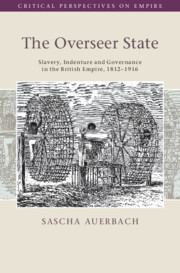Book contents
- The Overseer State
- Critical Perspectives on Empire
- The Overseer State
- Copyright page
- Dedication
- Dedication
- Contents
- Maps and Tables
- Plantations
- Preface
- Acknowledgments
- Introduction
- 1 “Not Fit for the Enjoyment of Freedom”
- 2 “To Go and Look for Law”
- 3 “A Most Imperfect Act of Abolition”
- 4 “A System Entirely Favorable to the Poorer Class of Natives”
- 5 “Man, in His Natural State … Must Either Be Led by Conviction, or by Force”
- 6 “They Must Know Their Master, and He Must Know Them”
- 7 “They Have Made the Government Arbitrary Enough”
- Conclusion
- Bibliography
- Index
Conclusion
The Persistent Legacies of the Overseer-State
Published online by Cambridge University Press: 21 March 2025
- The Overseer State
- Critical Perspectives on Empire
- The Overseer State
- Copyright page
- Dedication
- Dedication
- Contents
- Maps and Tables
- Plantations
- Preface
- Acknowledgments
- Introduction
- 1 “Not Fit for the Enjoyment of Freedom”
- 2 “To Go and Look for Law”
- 3 “A Most Imperfect Act of Abolition”
- 4 “A System Entirely Favorable to the Poorer Class of Natives”
- 5 “Man, in His Natural State … Must Either Be Led by Conviction, or by Force”
- 6 “They Must Know Their Master, and He Must Know Them”
- 7 “They Have Made the Government Arbitrary Enough”
- Conclusion
- Bibliography
- Index
Summary
The book’s conclusion asserts that the overseer-state, in terms of both labor governance and responses to it, was one of the most important “legacies of slavery.” The effects of the indenture system were particularly profound and widespread, most visibly in the social, political, and cultural dynamics of multiracial (but highly unequal) societies in Mauritius, the British Caribbean, and Malaya, and in the establishment of long-range, long-term labor mobility as the norm in a globalized system of labor transportation and organization. Through the overseer-state, the long-term impact of slavery and its aftermath were felt acutely even in places such as Malaysia, where plantation slavery had never been a prevalent practice. In the regions where the British imperial state was most powerful, the dynamics of governance and the history of slavery remained entangled well beyond the centenary of the slave trade’s abolition.
- Type
- Chapter
- Information
- The Overseer StateSlavery, Indenture and Governance in the British Empire, 1812–1916, pp. 324 - 338Publisher: Cambridge University PressPrint publication year: 2025

